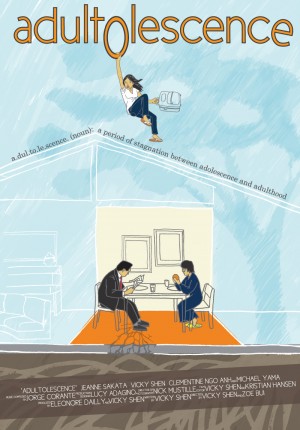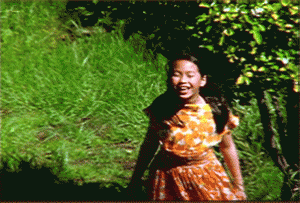 One of the best and worst parts about the Los Angeles Asian Pacific Film Festival is the sheer number of screenings that are happening simultaneously. Obviously, it’s great to have an enormous slate of programming to choose from, but the flip side is that there are always inevitable scheduling conflicts which prevent you from seeing everything you want.
One of the best and worst parts about the Los Angeles Asian Pacific Film Festival is the sheer number of screenings that are happening simultaneously. Obviously, it’s great to have an enormous slate of programming to choose from, but the flip side is that there are always inevitable scheduling conflicts which prevent you from seeing everything you want.
One of the films I personally missed at LAAPFF 2011 was Adultolescence, a film dealing with an Asian American family’s dynamics. Blending the two words “adulthood” and “adolescence,” filmmaker Vicky Shen (accidentally) timed the release of her film perfectly, coinciding with the infamous “Tiger Mom” hubbub (which we’ve talked about ad nauseum). The film (unintentionally) demystifies the Tiger Mom debate by revealing that there is no unifying rulebook when it comes to Asian parenting, portraying an Asian mother by humanizing her, rather than making her a stereotype.
 Adultolescence presents the psychological landscape of a first generation Asian-American family, adding elements of selective memory, voyeurism, escapism, and magical realism, all as ingredients that constantly alter the character of a perceived legacy by the youngest daughter, Lea May. The story begins when Lea returns home after a major career disappointment. She is catapulted back into her real but tainted memories of growing up under the scrutiny of her immigrant mother’s watchful eye that turns into a silencing but damaging disownment. As she films her present-day family and learns what it means to become an artist, Lea must confront the variations of truth that has led her to her own stagnancy and blame. By turns, she realizes there is no escape, fantasy or otherwise, from the unconditional and almost insufferable love she shares with her mother.
Adultolescence presents the psychological landscape of a first generation Asian-American family, adding elements of selective memory, voyeurism, escapism, and magical realism, all as ingredients that constantly alter the character of a perceived legacy by the youngest daughter, Lea May. The story begins when Lea returns home after a major career disappointment. She is catapulted back into her real but tainted memories of growing up under the scrutiny of her immigrant mother’s watchful eye that turns into a silencing but damaging disownment. As she films her present-day family and learns what it means to become an artist, Lea must confront the variations of truth that has led her to her own stagnancy and blame. By turns, she realizes there is no escape, fantasy or otherwise, from the unconditional and almost insufferable love she shares with her mother.
I was excited to learn that Adultolescence will be screening again in Los Angeles for free [RSVP here] on Monday, June 6 at USC School of Cinematic Arts as a part of the SCA Summer Screening Series called “Outside the Box.” Filmmaker Vicky Shen will be there to present the film and answer questions following the screening. The screening is a bit of a homecoming, since Vicky received her B.A. in film production from USC. While she was there, her advanced student film, The Killing Seasons— which she wrote, directed and acted in– garnered awards at several film festivals, including the Tampere International Short Film Festival, and was a finalist at the DGA Student Awards. Her screenplay “Untitled Hours Project” was a semi-finalist at the Sundance Institute and Steven Spielberg’s Chesterfield Writer’s Project.
If you’re not in L.A., keep track of upcoming screenings in your area on their blog, but until then, Vicky was nice enough to answer a few questions for 8Asians:
When did you know you wanted to make films?
When I was an adolescent, I really wanted to act because I could escape through all these different stories and characters with specific lives and history. Not that I could verbalize that at the time. As I got older, I realized that what I did naturally was observe people, behaviour, and how they would act in specific circumstances or situations. By the time I went to college, I realized that creating a narrative and visual story choices came with my imagination during performing, and that’s when I decided to get a film school education instead of studying theater arts.
 What themes did you want to cover in Adultolescence?
What themes did you want to cover in Adultolescence?
I wanted to make Adultolescence as an emotional survey of the psychological landscape of family dynamics, through the eyes of a single family member, but also present multiple points-of-view. I knew this would be crucial, when reinterpreting another story of cultural gap and assimilation, to present something provocative or, at least, emotionally true in order to create a cinematic forum for discussion.
The story’s central struggle that threatens the relationship between child and parent is fundamental differences; resulting in a daughter who feels unaccepted and thus unequipped for the real world; and a mother underappreciated as her definition of success is wrapped up in having a “successful family.” The tragic conceit of this family’s stunted growth is that both Lea and her parents’ perspectives collide, yet both are justified in their world views.
It is with thoughtful characterizations that Adultolescence presents its dilemma: knowing their parents sacrificed their livelihood to secure their children’s future, how do first-generation Americans reconcile fulfilling parental expectations and going after their own dreams? Inspired by the spirit of Cassavettes’ films, I hope to provide humor and insight into this longstanding conflict by exposing the organic progression of family discontent in its raw, disjointed manifestations. I believe Adultolescence explores culturally-specific ideas, but delves into more satisfying, universal themes of family disconnection and alienation.
What was the most challenging aspect of making this film?
The most challenging aspect of making this film was getting the confidence to endure the films ups and downs, and to show the confidence necessary when you’re soliciting talented artists to work on the film for little to no pay because this film was to be shot dogma style.
Is this movie autobiographical?
I’ve often asked myself the question, “just what is autobiographical.” Early on, while developing the script, I knew that by trying to be pitch-perfect with events, it gets further away from the essence of reality and truth. You place actors, lights, and a camera, and it’s never going to be an autobiography. I think the essence of truth is by searching for a parallel story that resembles the truth more. This sounds esoteric? But, sometimes I feel defensive like just because the film answers one word questions about myself, like “Yes, I’m Asian-American, and yes my parents are immigrants, and yes I’m a filmmaker,” that this is just a self-involved diatribe. After all, non-fictional elements have to be rewritten in order to create a story and character arc even if not heavily plot-driven. Adultolescence has a loose three act structure, not a tidy narrative not because it’s rambling on but because it’s character driven and it works with the themes of the movie. Then, again, I feel liberated because if a viewer feels this is so real, so cinema-verite, then that’s the ultimate compliment. If they feel it’s just a diary, then that’s not what I intended. Hopefully, I’m creating a story that seeks nothing but itself, regardless of a mainstream audience, as hard as that is on the personal ego. In conclusion, I feel the story has a life of it’s own separate from me as a filmmaker.
Did anything surprise you during or after the production of the film?
I wasn’t really surprised about the process of filmmaking because I had made short films before. But, I was surprised about how detail oriented editing a feature can be simply because of the length. Changing one section of a scene by mood, pacing, or tone not only alters the story flow of a scene but has a domino effect over a whole sequence or the whole film. I also wanted to make sure that cutting parts out of the film didn’t somehow affect the strong parts, and what made them work.
After the film was complete, I was surprised that my film would be considered a niche film because it depicts an American family rarely seen in the movies. I guess I’m still naive about how much race plays a part in how a film is categorized and marketed. But, on an individual level, I’ve gotten positive feedback on how the film is able to transcend ethnic borders through its universal themes and issues.
What kind of audience reaction have you received?
The audience reaction was stupendous at the LA Asian Pacific Film Festival. The film seemed to resonate emotionally and psychologically with the audience, instead of just on an intellectual level or from a spectator’s perspective. There were both laughs and tears, which made me feel that not only did the film connect with the audience but the audience was connected with each other.
The Cleveland International Film Festival also gave me a strong review …”Not only does the film refrain from summing up the Asian-American experience, the story leads to a gripping dynamic, and shifts gears to an emotional hyperdrive. Turns out Adultolescence had many layers that kept me on my toes. Each argument was written and acted out in a fashion to where immediate judgment was difficult to render. The flaws were evenly distributed enough for one to develop their own personal connection and/or relation to the situation. If it worked on me, it can definitely work on the masses.”
What advice do you have for young filmmakers?
The advice I would have for aspiring filmmakers is never to wait to pursue creative passions. Be prepared but not too cautious nor practical or creativity has a way of getting postponed. Thinking of a film as a work-in-progress helps to free yourself from ideas of perfection and being judged. And, above all, honor the medium of being able to weave smaller stories into a larger framework of universal themes to reach larger and diverse audiences.
What are your comfort foods and what memories do you have associated with them?
The comfort food I like most is mint chocolate-chip ice-cream. I used to eat ice-cream every night before going to bed, while growing up. I would beat it with a spoon until it had the consistency of frozen yogurt. It made my taste buds feel satisfied right before I went to sleep. No wonder I’m such a night owl. I would also sneak ice-cream bars to bed, and one time my mom came in so I had to hide it under my shirt. My mom (of course) caught me anyway, and saw what a mess I made. That still makes me laugh at visualizing it.
What’s your guilty pleasure?
My guilty pleasure is buying unnecessary toddler things for my daughter thinking that I better get it for her now before she outgrows it, which is counterintuitive because whatever the gift is, it won’t last long. It’s completely sentimental and against the way I was brought up… to be practical with money.
- Excited
- Fascinated
- Amused
- Disgusted
- Sad
- Angry








